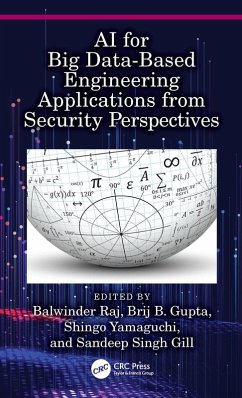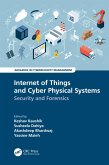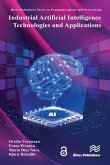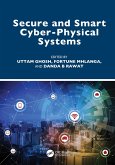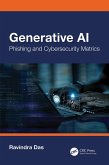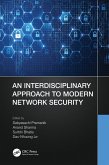AI for Big Data-Based Engineering Applications from Security Perspectives (eBook, PDF)
Redaktion: Raj, Balwinder; Gill, Sandeep Singh; Yamaguchi, Shingo; Gupta, Brij B.
46,95 €
46,95 €
inkl. MwSt.
Sofort per Download lieferbar

23 °P sammeln
46,95 €
Als Download kaufen

46,95 €
inkl. MwSt.
Sofort per Download lieferbar

23 °P sammeln
Jetzt verschenken
Alle Infos zum eBook verschenken
46,95 €
inkl. MwSt.
Sofort per Download lieferbar
Alle Infos zum eBook verschenken

23 °P sammeln
AI for Big Data-Based Engineering Applications from Security Perspectives (eBook, PDF)
Redaktion: Raj, Balwinder; Gill, Sandeep Singh; Yamaguchi, Shingo; Gupta, Brij B.
- Format: PDF
- Merkliste
- Auf die Merkliste
- Bewerten Bewerten
- Teilen
- Produkt teilen
- Produkterinnerung
- Produkterinnerung

Bitte loggen Sie sich zunächst in Ihr Kundenkonto ein oder registrieren Sie sich bei
bücher.de, um das eBook-Abo tolino select nutzen zu können.
Hier können Sie sich einloggen
Hier können Sie sich einloggen
Sie sind bereits eingeloggt. Klicken Sie auf 2. tolino select Abo, um fortzufahren.

Bitte loggen Sie sich zunächst in Ihr Kundenkonto ein oder registrieren Sie sich bei bücher.de, um das eBook-Abo tolino select nutzen zu können.
This book emphasizes the idea of understanding the motivation of the advanced circuits' design to establish the AI interface and to mitigate the security attacks in a better way for big data. It is for students, researchers, and professionals, faculty members and software developers who wish to carry out further research.
- Geräte: PC
- mit Kopierschutz
- eBook Hilfe
Andere Kunden interessierten sich auch für
![AI for Big Data-Based Engineering Applications from Security Perspectives (eBook, ePUB) AI for Big Data-Based Engineering Applications from Security Perspectives (eBook, ePUB)]() AI for Big Data-Based Engineering Applications from Security Perspectives (eBook, ePUB)46,95 €
AI for Big Data-Based Engineering Applications from Security Perspectives (eBook, ePUB)46,95 €![Internet of Things and Cyber Physical Systems (eBook, PDF) Internet of Things and Cyber Physical Systems (eBook, PDF)]() Internet of Things and Cyber Physical Systems (eBook, PDF)62,95 €
Internet of Things and Cyber Physical Systems (eBook, PDF)62,95 €![Industrial Artificial Intelligence Technologies and Applications (eBook, PDF) Industrial Artificial Intelligence Technologies and Applications (eBook, PDF)]() Industrial Artificial Intelligence Technologies and Applications (eBook, PDF)0,99 €
Industrial Artificial Intelligence Technologies and Applications (eBook, PDF)0,99 €![Secure and Smart Cyber-Physical Systems (eBook, PDF) Secure and Smart Cyber-Physical Systems (eBook, PDF)]() Secure and Smart Cyber-Physical Systems (eBook, PDF)51,95 €
Secure and Smart Cyber-Physical Systems (eBook, PDF)51,95 €![Generative AI (eBook, PDF) Generative AI (eBook, PDF)]() Ravindra DasGenerative AI (eBook, PDF)26,95 €
Ravindra DasGenerative AI (eBook, PDF)26,95 €![An Interdisciplinary Approach to Modern Network Security (eBook, PDF) An Interdisciplinary Approach to Modern Network Security (eBook, PDF)]() An Interdisciplinary Approach to Modern Network Security (eBook, PDF)46,95 €
An Interdisciplinary Approach to Modern Network Security (eBook, PDF)46,95 €![Cyber Security for Next-Generation Computing Technologies (eBook, PDF) Cyber Security for Next-Generation Computing Technologies (eBook, PDF)]() Cyber Security for Next-Generation Computing Technologies (eBook, PDF)51,95 €
Cyber Security for Next-Generation Computing Technologies (eBook, PDF)51,95 €-
-
-
This book emphasizes the idea of understanding the motivation of the advanced circuits' design to establish the AI interface and to mitigate the security attacks in a better way for big data. It is for students, researchers, and professionals, faculty members and software developers who wish to carry out further research.
Dieser Download kann aus rechtlichen Gründen nur mit Rechnungsadresse in A, B, BG, CY, CZ, D, DK, EW, E, FIN, F, GR, HR, H, IRL, I, LT, L, LR, M, NL, PL, P, R, S, SLO, SK ausgeliefert werden.
Produktdetails
- Produktdetails
- Verlag: Taylor & Francis
- Seitenzahl: 266
- Erscheinungstermin: 30. Juni 2023
- Englisch
- ISBN-13: 9781000901504
- Artikelnr.: 68117944
- Verlag: Taylor & Francis
- Seitenzahl: 266
- Erscheinungstermin: 30. Juni 2023
- Englisch
- ISBN-13: 9781000901504
- Artikelnr.: 68117944
- Herstellerkennzeichnung Die Herstellerinformationen sind derzeit nicht verfügbar.
Dr. Balwinder Raj (MIEEE'2006) did his B.Tech., Electronics Engineering (PTU Jalandhar); M.Tech., Microelectronics (PU Chandigarh); and Ph.D., VLSI Design (IIT Roorkee), India in 2004, 2006, and 2010, respectively. For his postdoctoral research work, the European Commission awarded him "Erasmus Mundus" Mobility of life research fellowship based on his studies at the University of Rome, Tor Vergata, Italy in 2010-2011. Dr. Raj received the India4EU (India for European Commission) Fellowship and worked as a visiting researcher at KTH University, Stockholm, Sweden, October-November 2013. He also visited Aalto University, Finland, as a visiting researcher during June 2017. Currently, he is working as an Associate Professor at the Dr B. R. Ambedkar National Institute of Techology Jalandhar, India; previously, he worked at National Institute of Technical Teachers Training and Research Chandigarh, India. Dr. Raj has also worked as an Assistant Professor at ABV-IIITM Gwalior (An autonomous institute established by Ministry of HRD, Govt. of India) from July 2011 to April 2012. He has received the Best Teacher Award from Indian Society for Technical Education (ISTE) New Delhi on 26 July 2013. Dr. Raj received the Young Scientist Award from Punjab Academy of Sciences during the 18th Punjab Science Congress held on 9 February 2015. He has also received a research paper award in the International Conference on Electrical and Electronics Engineering held at Pattaya, Thailand, from 11 to 12 July 2015. Dr. Raj has authored/co-authored 5 books, 12 book chapters, and more than 100 research papers in peer-reviewed international/national journals and conferences. His areas of interest in research are classical/non-classical nanoscale semiconductor device modeling; nanoelectronics and their applications in hardware security, sensors and circuit design, FinFET-based memory design, low-power VLSI design, digital/ analog VLSI design, and FPGA implementation. Prof. Brij B. Gupta is working as the Director of International Center for AI and Cyber Security Research, Incubation and Innovations, and as a Full Professor with the Department of Computer Science and Information Engineering (CSIE), Asia University, Taiwan. In more than 17 years of professional experience, he has published over 500 papers in journals/conferences including 35 books and 10 Patents with over 19,500 citations. He has received numerous national and international awards including the Canadian Commonwealth Scholarship (2009), Faculty Research Fellowship Award (2017), MeitY, GoI, IEEE GCCE outstanding and WIE paper awards and Best Faculty Award (2018 and 2019), NIT KKR, respectively. Prof. Gupta was recently selected for 2022 Clarivate Web of Science Highly Cited Researchers in Computer Science (He is the only researcher from Taiwan and India in Computer Science in this prestigious 2022 HCR List). He was also selected in the 2022, 2021, and 2020 Stanford University ranking of the world's top 2% scientists. He is also a Visiting/ Adjunct Professor with several universities worldwide. He is also an IEEE Senior Member (2017) and was selected as 2021 Distinguished Lecturer in IEEE CTSoc. Dr. Gupta is also serving as Member-in-Large, Board of Governors, IEEE Consumer Technology Society (2022-2024). He is also leading IJSWIS, IJSSCI, STE, and IJCAC as Editor-in-Chief. Moreover, he is also serving as Lead-Editor of a Book Series with CRC and IET Press. He also served as TPC Member in more than 150 international conferences and is also serving as Associate/Guest Editor of various journals and transactions. His research interests include information security, cyber physical systems, cloud computing, blockchain technologies, intrusion detection, AI, social media, and networking. Dr. Shingo Yamaguchi is a Professor in the Graduate School of Sciences and Technology for Innovation, Yamaguchi University, Japan. He received the B.E., M.E., and D.E. degrees from Yamaguchi University, Japan, in 1992, 1994, and 2002, respectively. He was a Visiting Scholar of University of Illinois at Chicago, U.S., in 2007. He is currently the Director of the Center for Information and Data Science Education, Yamaguchi University. He also serves as the Editor-in-Chief of International Journal of Internet of Things and Cyber-Assurance. He was part of the Board of Governors of IEEE Consumer Electronics Society and served as the Editor-in-Chief of IEEE Consumer Electronics Magazine. He was also a Conference Chair of IEEE International Conferences, such as GCCE 2014 and ICCE 2021. He is a Senior Member of IEEE and IEICE. Dr. Sandeep Singh Gill is currently Professor and Head in ECE Department NITTTR Chandigarh. He has more than 25 years of teaching and research experience. He has also held many administrative positions like Dean Academic, Dean Administration, Coordinator of TEQIP, Head of Department, and many more. Dr. Gill has guided 110 M.Tech. theses and many Ph.D. scholars. He has published more than 150 research papers in international/national journals and conferences and filed one patent. His research areas are VLSI design automation, soft computing, and CAD tools.
1. Artificial Intelligence-Empowered 3D Bioprinting
2. AI and IoT in Smart Healthcare
3. Spintronic Technology Applications for Artificial Intelligence
4. AI-Based ECG Signal Monitoring System for Arrhythmia Detection Using IoMT
5. Fast Image Desmogging for Road Safety Using Optimized Dark Channel Prior
6. Face Mask Detection Using Artificial Intelligence
7. Emerging Nonvolatile Memories for AI Applications
8. Intelligent Irrigation Systems
9. Reversible Logic Gates Using Quantum Dot Cellular Automata (QCA) Nanotechnology.
2. AI and IoT in Smart Healthcare
3. Spintronic Technology Applications for Artificial Intelligence
4. AI-Based ECG Signal Monitoring System for Arrhythmia Detection Using IoMT
5. Fast Image Desmogging for Road Safety Using Optimized Dark Channel Prior
6. Face Mask Detection Using Artificial Intelligence
7. Emerging Nonvolatile Memories for AI Applications
8. Intelligent Irrigation Systems
9. Reversible Logic Gates Using Quantum Dot Cellular Automata (QCA) Nanotechnology.
1. Artificial Intelligence-Empowered 3D Bioprinting
2. AI and IoT in Smart Healthcare
3. Spintronic Technology Applications for Artificial Intelligence
4. AI-Based ECG Signal Monitoring System for Arrhythmia Detection Using IoMT
5. Fast Image Desmogging for Road Safety Using Optimized Dark Channel Prior
6. Face Mask Detection Using Artificial Intelligence
7. Emerging Nonvolatile Memories for AI Applications
8. Intelligent Irrigation Systems
9. Reversible Logic Gates Using Quantum Dot Cellular Automata (QCA) Nanotechnology.
2. AI and IoT in Smart Healthcare
3. Spintronic Technology Applications for Artificial Intelligence
4. AI-Based ECG Signal Monitoring System for Arrhythmia Detection Using IoMT
5. Fast Image Desmogging for Road Safety Using Optimized Dark Channel Prior
6. Face Mask Detection Using Artificial Intelligence
7. Emerging Nonvolatile Memories for AI Applications
8. Intelligent Irrigation Systems
9. Reversible Logic Gates Using Quantum Dot Cellular Automata (QCA) Nanotechnology.
